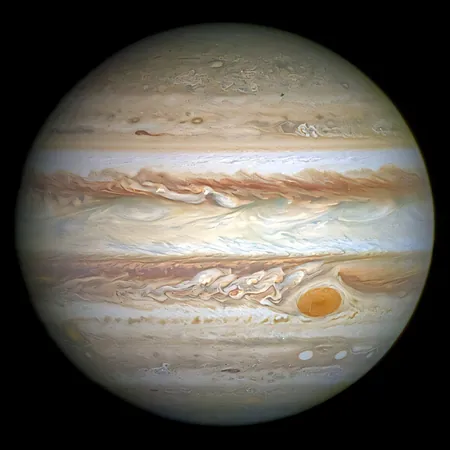
Harnessing Jupiter's Gravity: Could the Gas Giant Be Our Key to Unraveling Dark Matter?
2024-12-09
Author: Jacob
The Mystery of Dark Matter
The enigma of dark matter has puzzled scientists for decades, sparking intense discussions and debates. This elusive substance, believed to constitute about 27% of the universe, is invisible to conventional detection methods, rendering it a significant challenge in astrophysics. However, the latest research suggests that Jupiter, the largest planet in our solar system, could serve as a unique detector for dark matter.
Innovative Approach to Study Dark Matter
In a recent paper published on the arXiv preprint server by researchers Sandra Robles from Kings College London and Stephan Meighen-Berger from the University of Melbourne, the duo proposes an innovative approach to study dark matter interactions. They hypothesize that if dark matter consists of heavy, slow-moving particles, interactions with normal matter may produce neutrinos – elusive particles that could reveal the presence of dark matter.
Jupiter's Gravitational Role
Jupiter's immense gravitational field plays a crucial role in this proposal. With its ability to capture dark matter particles, the gas giant could potentially produce detectable neutrinos. The researchers suggest utilizing a water Cherenkov detector to observe for excess neutrinos originating from Jupiter within energy ranges of 100 MeV to 5 GeV. Such a detection could provide groundbreaking insights into the nature of dark matter.
Characteristics of Jupiter
Jupiter is a fascinating celestial body. Not only does it have the mass to envelop all other planets in the solar system, but it also possesses a robust magnetic field and a series of storms, including the famous Great Red Spot – a gigantic storm system that has been raging for centuries. The planet is primarily composed of hydrogen and helium, lacking a solid surface, which further highlights its unique characteristics.
Shifting Paradigms in Dark Matter Research
Traditionally, the search for dark matter has been focused on laboratory experiments where scientists attempt to detect interactions between dark matter and familiar particles in highly controlled environments. These interactions might release energy signatures allowing for the inference of dark matter's presence. However, the unique approach suggested by Robles and Meighen-Berger could shift the paradigm of dark matter research, looking to celestial bodies rather than solely relying on terrestrial experiments.
Implications of the Research
The potential impact of this research cannot be overstated. If successful, the detection of neutrinos from dark matter interactions on Jupiter could not only strengthen our understanding of the universe but also provide insights into the fundamental physics surrounding dark matter. As we stand on the brink of revelations that could reshape our understanding of cosmology, the search for dark matter continues to be one of the most tantalizing quests in modern science.
Conclusion
Could Jupiter truly hold the secrets to this cosmic mystery? Only time and further research will unveil the truth, but the implications of this innovative approach are indeed exciting for the future of astrophysics and our understanding of the universe.









 Brasil (PT)
Brasil (PT)
 Canada (EN)
Canada (EN)
 Chile (ES)
Chile (ES)
 España (ES)
España (ES)
 France (FR)
France (FR)
 Hong Kong (EN)
Hong Kong (EN)
 Italia (IT)
Italia (IT)
 日本 (JA)
日本 (JA)
 Magyarország (HU)
Magyarország (HU)
 Norge (NO)
Norge (NO)
 Polska (PL)
Polska (PL)
 Schweiz (DE)
Schweiz (DE)
 Singapore (EN)
Singapore (EN)
 Sverige (SV)
Sverige (SV)
 Suomi (FI)
Suomi (FI)
 Türkiye (TR)
Türkiye (TR)